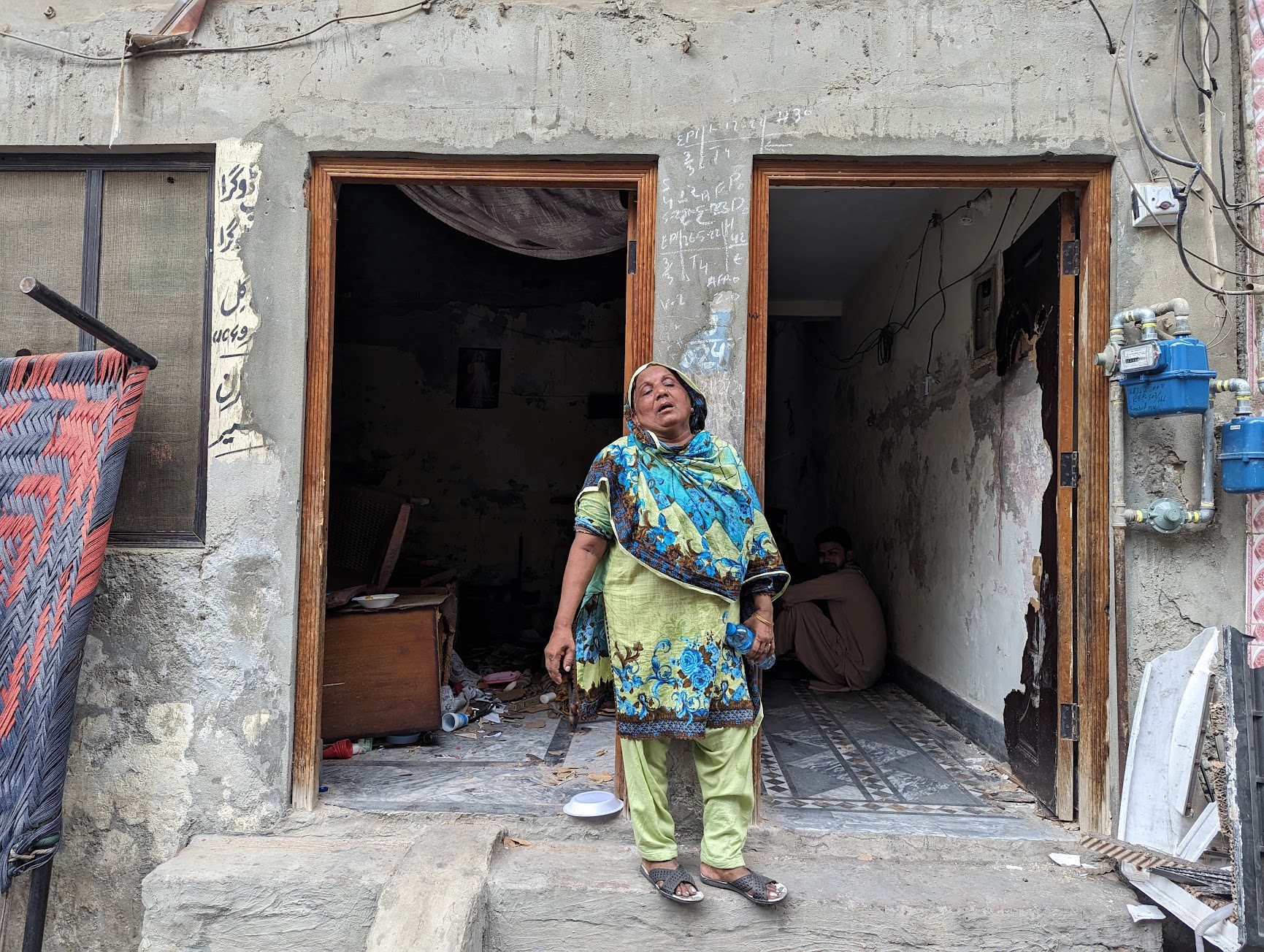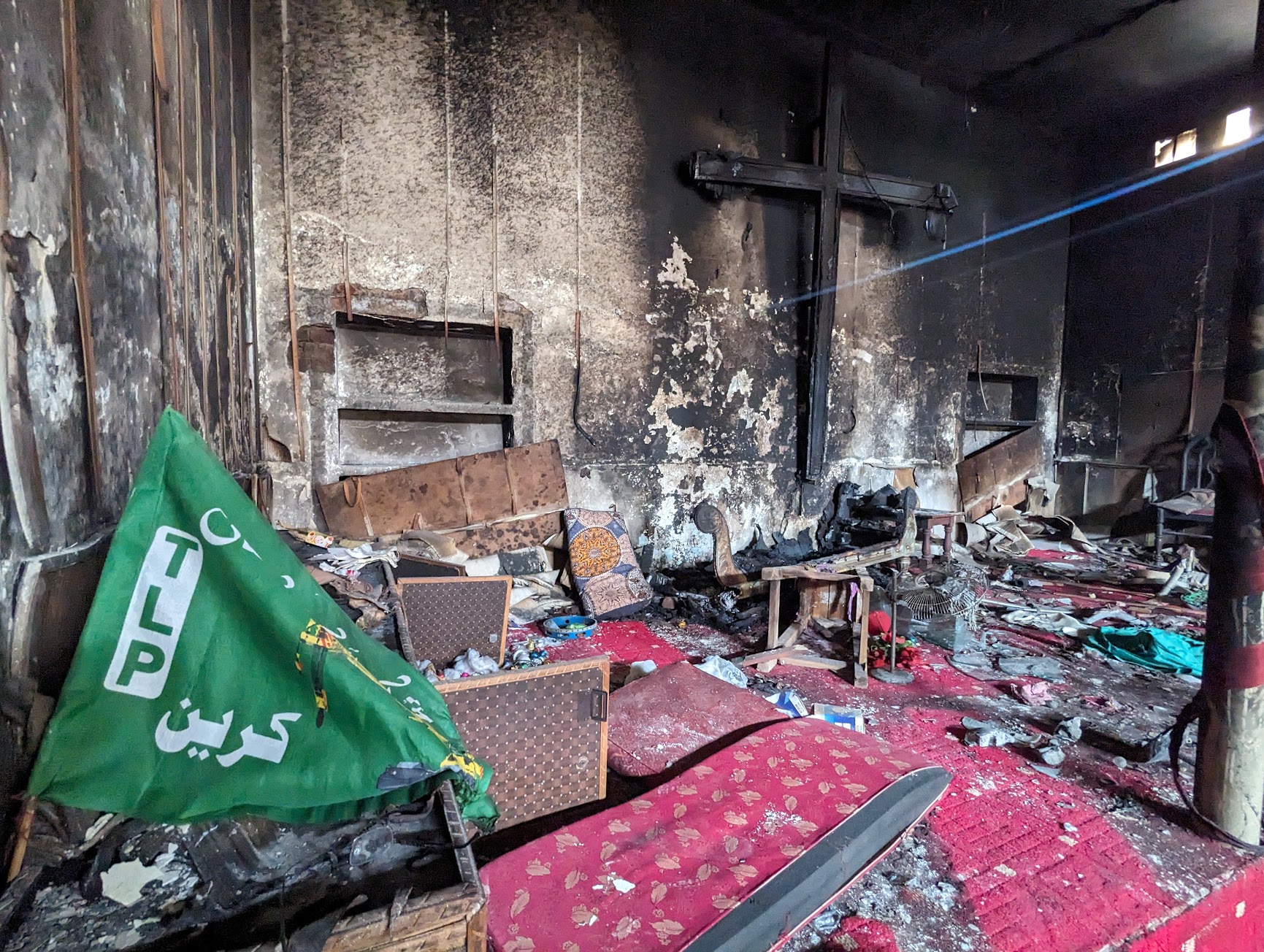
Jaranwala, Pakistan – Rina Javed Bhatti sat on a narrow street among a group of 20-25 worshippers, many of them sobbing profusely, while Pastor Javed Bhatti addressed his sermon in a Christian colony in northern Pakistan.
“We thank God almighty for protecting us, for taking care of us, and it is He who will help us get back on our feet,” the pastor said on Sunday, as some in the attendance, mostly women, broke into chants of “Hallelujah” with tears and sweat rolling down their faces in the hot and humid summer weather.
Sunday was the first service since Christian homes and places of worship in Jaranwala city located in Punjab province were attacked on August 16 by a Muslim mob over claims of blasphemy.
Rows of houses lining the narrow street bore witness to Thursday’s arson attack, with charred walls of houses, burned motorbikes, damaged furniture and blackened household items strewn around. Saint John’s Catholic Church on the next street lay in ruins.
Rina, 31, and her family, like most in the area, fled before the mob went on a rampage, torching homes and churches and, in many cases, taking away household valuables.
“We built our home brick by brick, but when we returned, we found ashes. The attackers burned and looted innocent people’s homes,” she told Al Jazeera.
Residents and officials told Al Jazeera that the violence began after tattered pages of the Quran and some pages with remarks insulting Islam scrawled on them were found roughly 100 metres from Rina’s home. The writer of this alleged blasphemous act was allegedly identified by his name, photo and phone number on one of the papers.
‘Unverified claims of blasphemy’
Pastor Javed recalls that it was close to 6am on August 16 when he heard a commotion in the street. As he stepped out he saw people standing outside his neighbour’s house to confront the suspect, who has denied desecrating the Quran.
The 41-year-old pastor says that he tried to reason with Muslims who lived in the neighbourhood, asking why somebody would reveal his identity after committing such a “heinous crime”.
“We have a neighbourhood peace committee and the Muslims said they will initiate a dialogue involving a cleric of a local mosque as well, but the news had already started spreading on social media like wildfire,” he told Al Jazeera, while sitting on a charpoy (cot) outside his burned house.
An announcement from a local mosque to protest and attack fuelled the anger, he says.
Blasphemy is an extremely sensitive issue in Pakistan, with people accused of insulting Islam in the past lynched or handed harsh punishments including the death penalty.
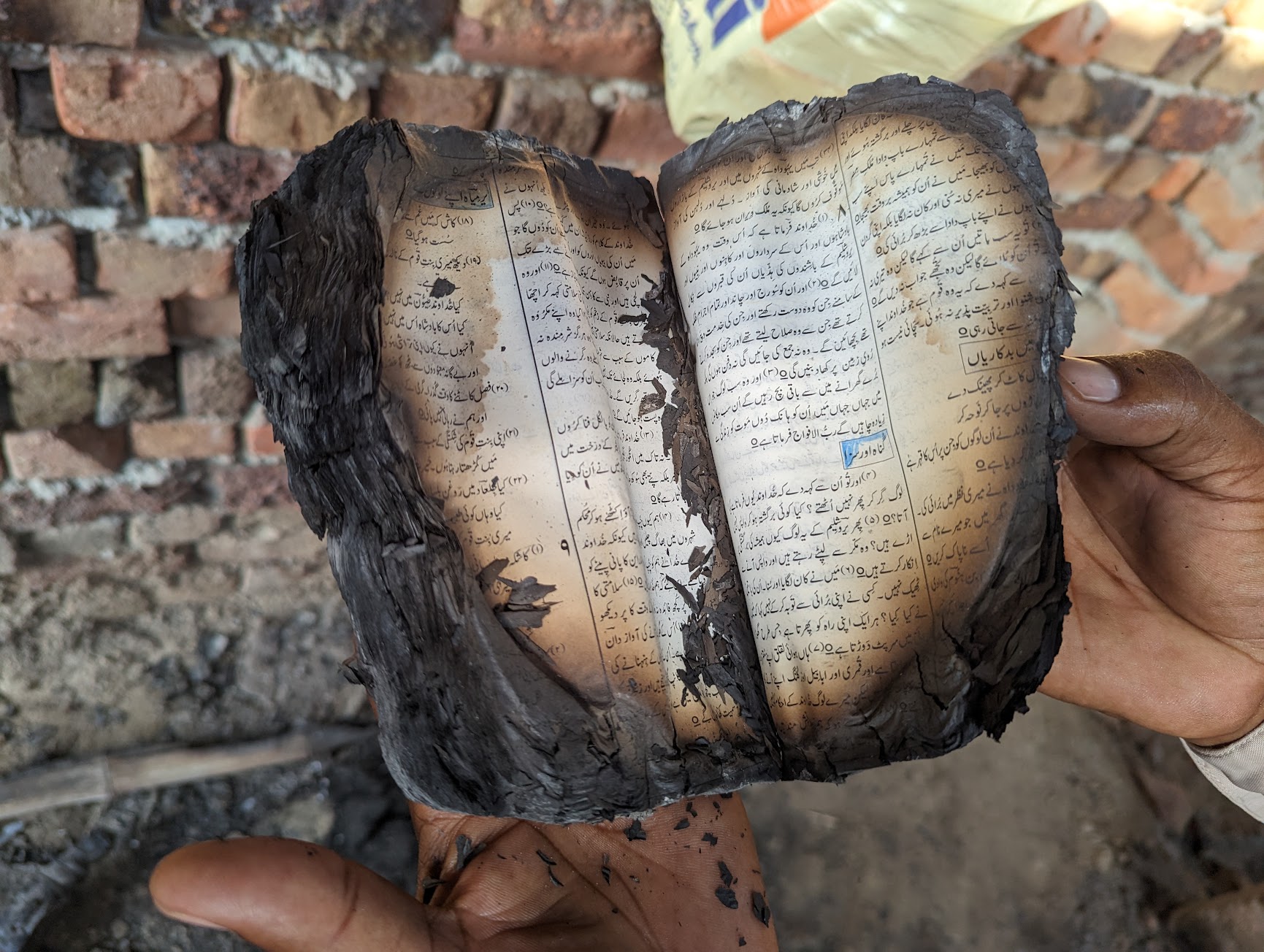
In 2021, a Sri Lankan factory manager was lynched in Sialkot city, about 200km north of Jaranwala, on accusations of blasphemy. The claim later turned out to be false.
In another case, more than 100 houses belonging to the Christian community were destroyed by a mob in the eastern city of Lahore over blasphemy allegations in 2013. A court in 2020 acquitted a Christian man who was accused of that crime.
Rights groups say that such violence is often aggravated due to unverified claims, in most cases due to personal enmity.
Pastor Javed says the allegations were his cue to start warning local Christian community leaders to leave their homes immediately for safer places. He and more than 100 families living in the Christian colony had to escape Jaranwala, situated roughly 115km (71 miles) northwest of Lahore, the provincial capital of Punjab.
Christian-Muslim ties eroded
Members of the community took shelter in factories, open fields and other nearby villages as mobs attacked their homes.
“We have been living in this neighbourhood for more than five decades and I can tell you that never once were we discriminated against on the basis of religion, let alone face such a grave accusation of blasphemy,” the pastor says.
“But I am aware of history. I know what havoc such allegations can cause.”
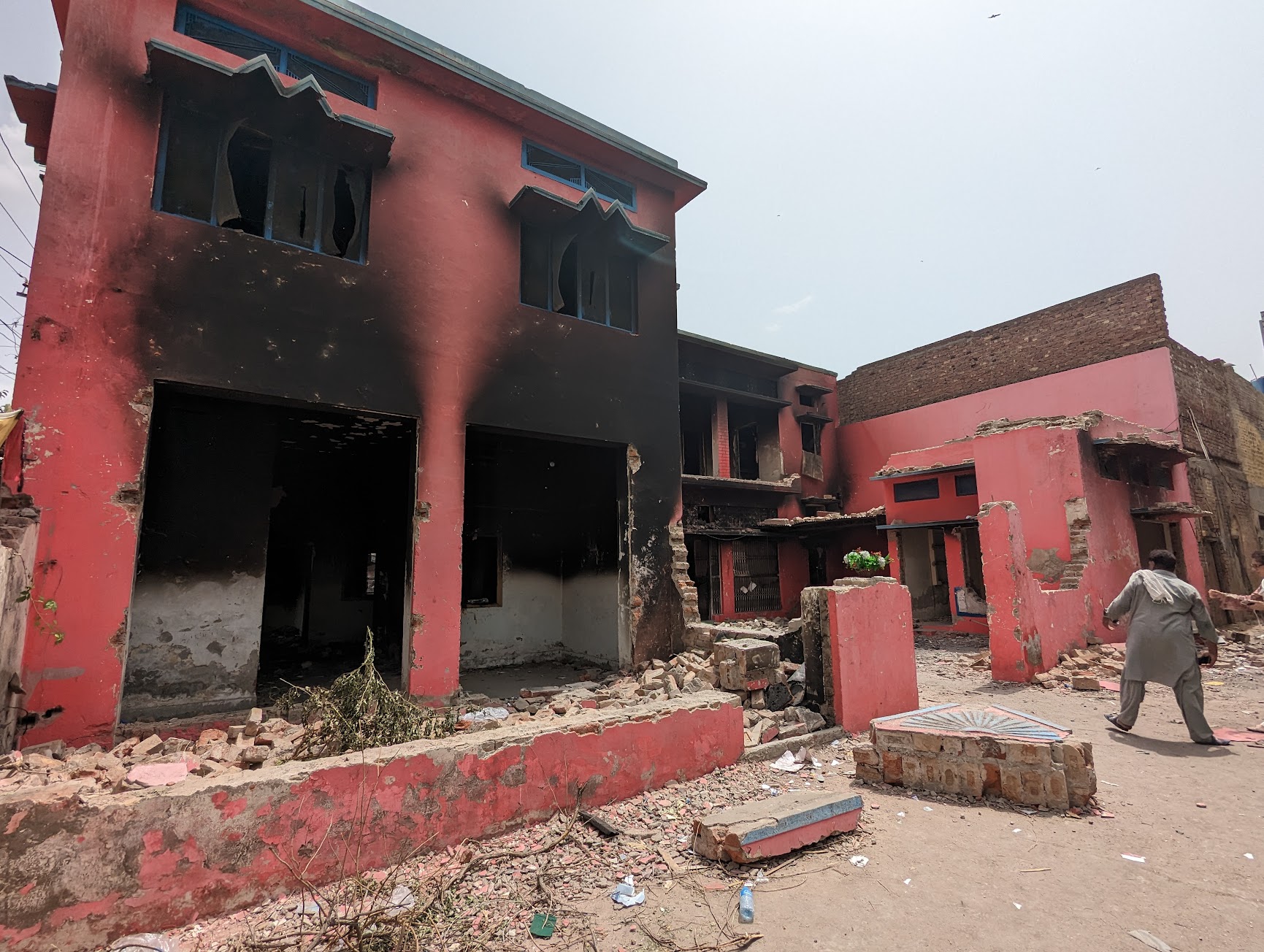
Sahar Maiskeem, who had fled with eight members of her family, returned two days later – the day of her planned wedding – to see her house destroyed.
“I had collected my own dowry with my own money, which I earned over three years by sewing clothes. Everything we had was either stolen or burnt. I don’t have anything left, not even my engagement ring,” she told Al Jazeera.
Faisal Afzal, a Muslim who lives in the same neighbourhood, said in his lifetime he had never heard of any rift or any controversy with his Christian neighbours.
“Those who caused this were not from our area. They do not understand the lasting damage that we have to deal with,” the 35-year-old told Al Jazeera.
Afzal said the violence eroded the trust between the two communities.
Police accused of delayed action
Muhammed Riaz, a police official in the area, says that once authorities were informed of the unfolding situation on August 16, they called a meeting between Christian and Muslim leaders at about 8am to defuse the situation.
The leaders from both communities backed police efforts to calm the situation, Riaz said. But a crowd of more than 500 Muslims gathered near the Christian colony outnumbered the police, he added.
“The crowd consisted mostly of young men, teenagers, wielding batons, sticks. And by 9 or 10am, as passions were running high, the mob attacked the churches and homes of Christians,” the police official said.
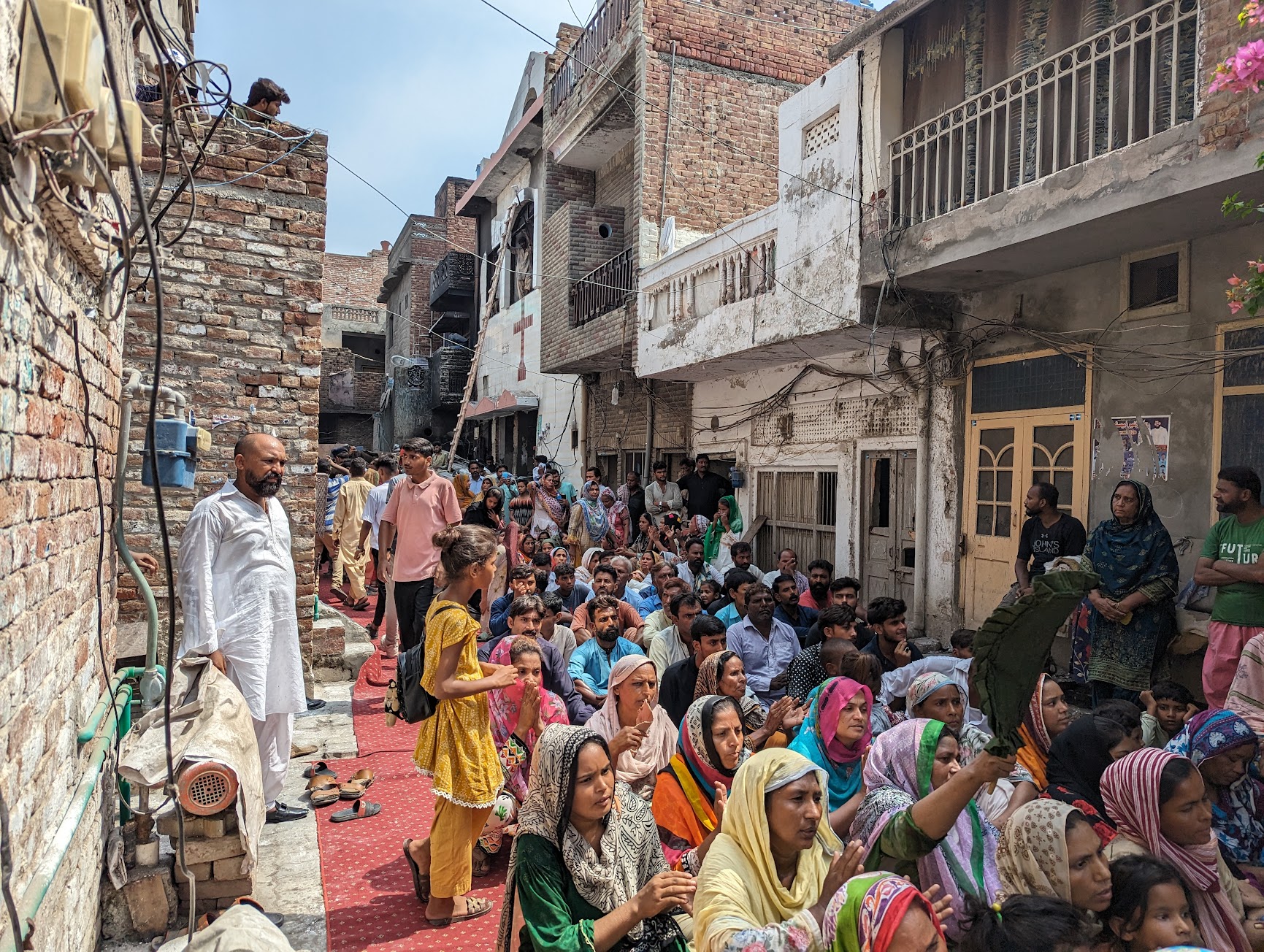
The crowd comprised residents and people from nearby villages as well as some from religious parties, the police said.
Videos that emerged of the violence on social media showed dozens of young men descending upon the Salvation Army Church near the Christian colony, a red-coloured structure built before the country’s independence in 1947.
The men were chanting slogans that are associated with Tehreek-e-Labbaik Pakistan (TLP), a far-right party. In multiple videos, they can be seen clambering up the roof of the church, destroying the cross and setting the building on fire.
Another video shows hundreds of men pouring into the main street of the Christian colony and attacking and torching St John’s Catholic Church as well as neighbouring houses – as police stood by.
A party flag of the TLP was also found lying near the altar of the Full Gospel Assemblies church, one of 21 destroyed churches that Al Jazeera visited. The party, however, has denied its involvement in the attacks and said it was at the forefront of efforts to alleviate tensions.
More than 100 arrested
The anti-Christian attacks drew widespread condemnation within Pakistan, prompting the caretaker government to assure swift action against the perpetrators.
Authorities have so far arrested more than 150 people in connection with the vandalism. Police also arrested two brothers – Rocky and Raja – who are accused of the blasphemy. Raja’s name was reportedly scrawled on the pages of the desecrated Quran.
The provincial government has also announced compensation of two million rupees ($24,000) for those who lost their homes, while also promising to rebuild all of the damaged churches.
According to an estimate by the Punjab province, close to 100 homes and at least 22 churches, over a radius of eight kilometres, were either completely or partially destroyed, causing damage worth nearly 70 million rupees ($233,000).
The police say they did their best to handle the situation and prevent deaths.
“I know that loss of property is huge, but at least it can still be replaced, repaired. We wanted to ensure that people’s lives remain out of danger,” Usman Akram Gondal, a senior police official, told Al Jazeera.
But activists and researchers have accused the authorities of acting too slowly to stop rumours from spreading on social media.
According to Bytes for All, an Islamabad-based research organisation, Facebook and Twitter were primarily used to “fuel the violence” after the blasphemy accusations emerged, and they subsequently spread through other platforms including TikTok and YouTube.
“Our monitoring shows around a million people were reached through Twitter and Facebook posts about the incident,” Shahzad Ahmad, country director for Bytes for All, told Al Jazeera.
Meanwhile, back in the Christian colony, Jan Masih says he does not know if he will ever be able to rebuild his house.
“Are we going to feed our children, or save money to rebuild it again?” Masih, who works as a sanitation worker, said.
But for the 39-year-old, the incident has also damaged the trust he shared with his Muslim neighbours.
“Our colony was a model of peace and unity. But this one incident has sent us back centuries. I don’t feel any safety or security here any more,” he said.
